Contemporary Hospitality Industry Report: Assessment and Evaluation
VerifiedAdded on 2020/10/05
|10
|2588
|412
Report
AI Summary
This report provides a comprehensive overview of the contemporary hospitality industry, examining its scale, scope, and diversity within the UK context. It delves into the organizational structures of various hospitality businesses, exploring staffing requirements and qualification expectations. The report analyzes managerial, operational, and legislative issues, along with the current image of the hospitality sector. Furthermore, it addresses potential developments, trends, and their impact on the industry. The report also includes an analysis of the current scale, scope, and diversity of the hospitality industry, including different types of ownership, and the contribution and impact they have on the UK economy. The report also discusses the different types of organizational structures, staffing requirements, and professional bodies within the hospitality industry.
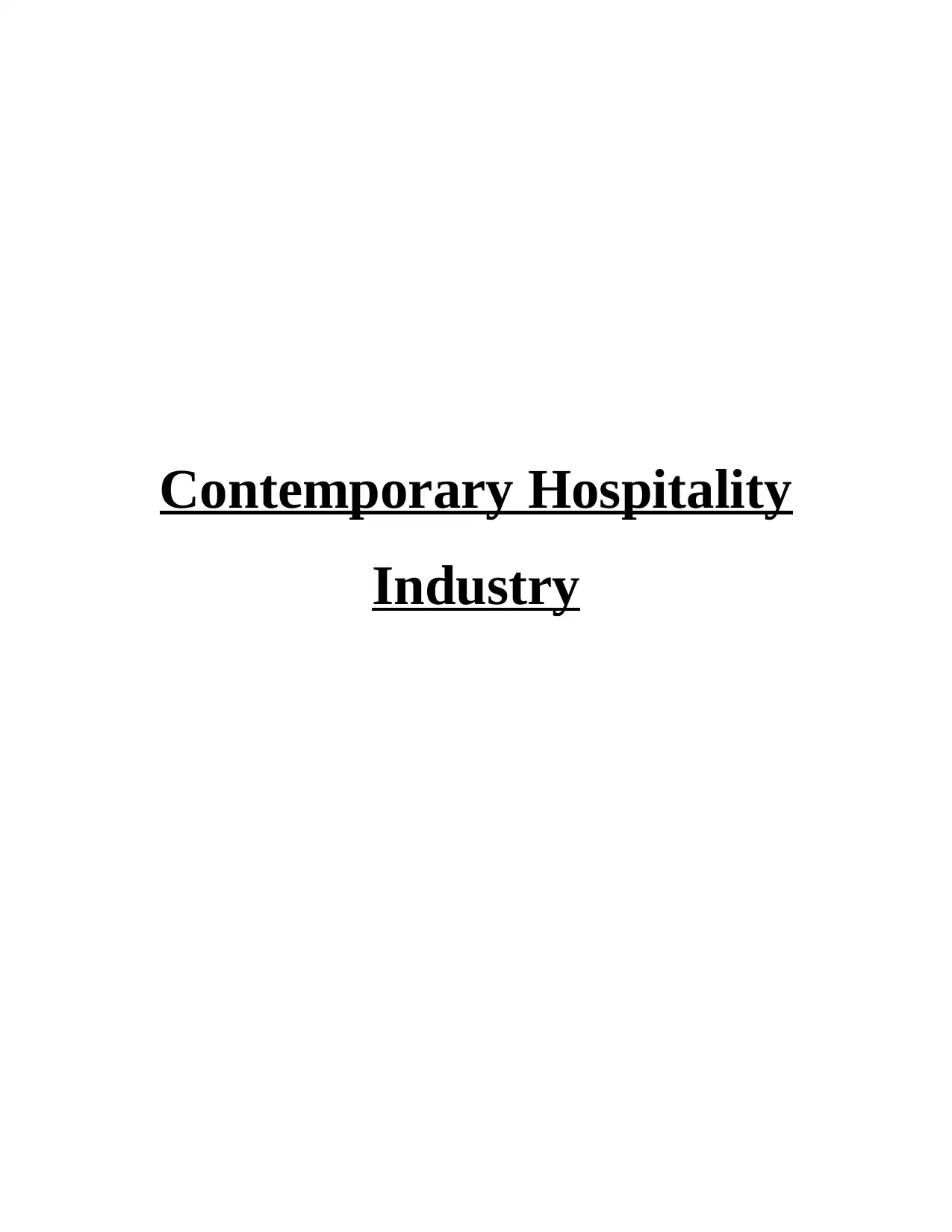
Contemporary Hospitality
Industry
Industry
Paraphrase This Document
Need a fresh take? Get an instant paraphrase of this document with our AI Paraphraser
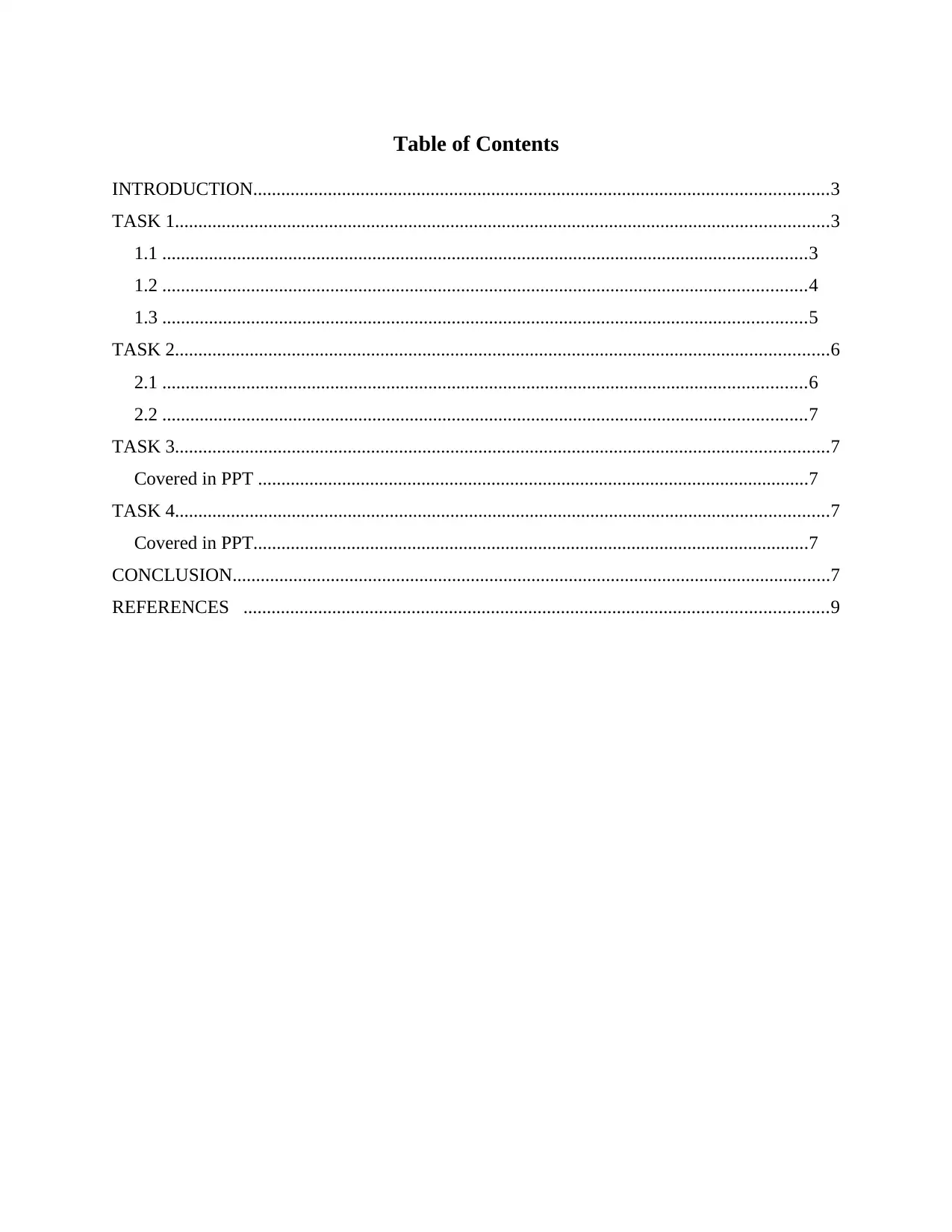
Table of Contents
INTRODUCTION...........................................................................................................................3
TASK 1............................................................................................................................................3
1.1 ..........................................................................................................................................3
1.2 ..........................................................................................................................................4
1.3 ..........................................................................................................................................5
TASK 2............................................................................................................................................6
2.1 ..........................................................................................................................................6
2.2 ..........................................................................................................................................7
TASK 3............................................................................................................................................7
Covered in PPT ......................................................................................................................7
TASK 4............................................................................................................................................7
Covered in PPT.......................................................................................................................7
CONCLUSION................................................................................................................................7
REFERENCES .............................................................................................................................9
INTRODUCTION...........................................................................................................................3
TASK 1............................................................................................................................................3
1.1 ..........................................................................................................................................3
1.2 ..........................................................................................................................................4
1.3 ..........................................................................................................................................5
TASK 2............................................................................................................................................6
2.1 ..........................................................................................................................................6
2.2 ..........................................................................................................................................7
TASK 3............................................................................................................................................7
Covered in PPT ......................................................................................................................7
TASK 4............................................................................................................................................7
Covered in PPT.......................................................................................................................7
CONCLUSION................................................................................................................................7
REFERENCES .............................................................................................................................9
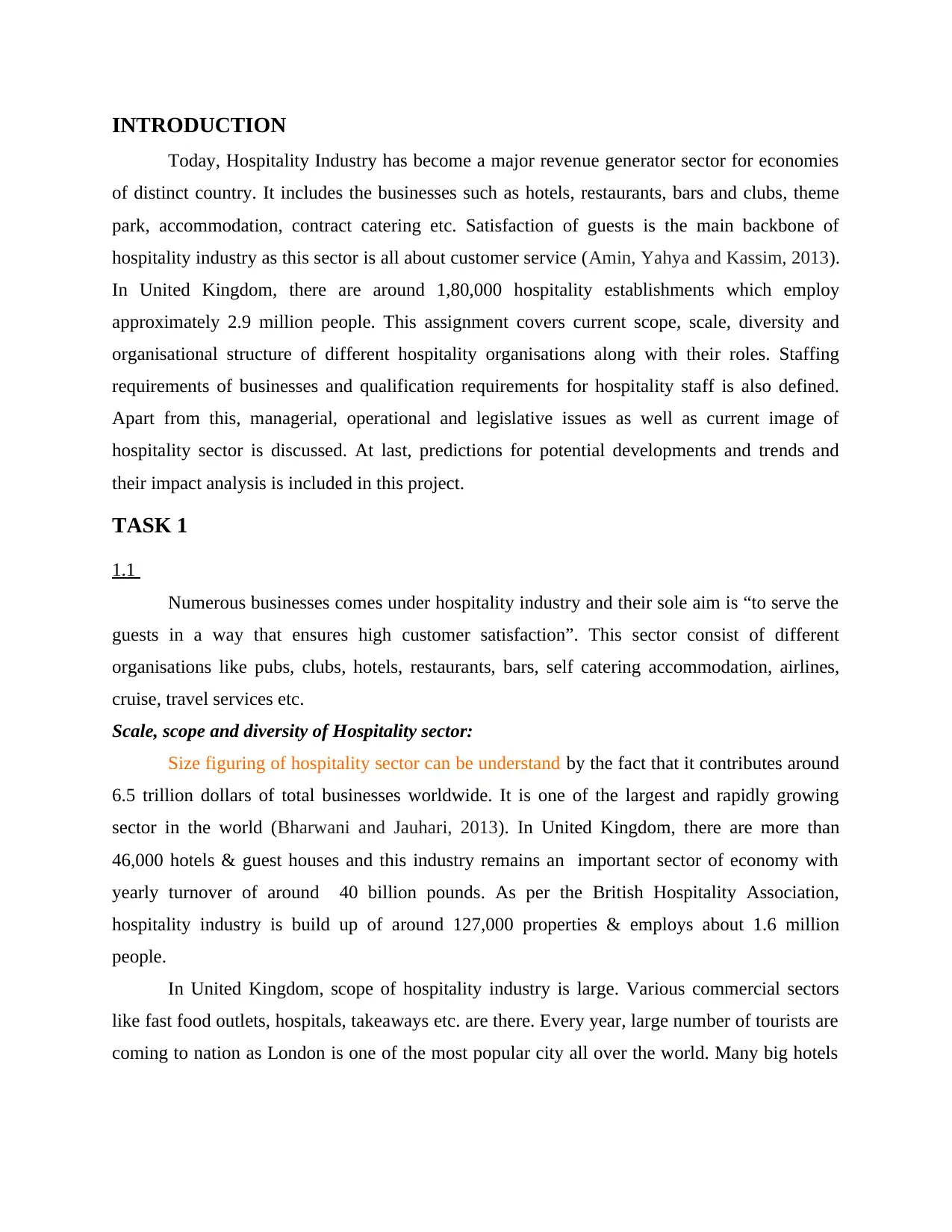
INTRODUCTION
Today, Hospitality Industry has become a major revenue generator sector for economies
of distinct country. It includes the businesses such as hotels, restaurants, bars and clubs, theme
park, accommodation, contract catering etc. Satisfaction of guests is the main backbone of
hospitality industry as this sector is all about customer service (Amin, Yahya and Kassim, 2013).
In United Kingdom, there are around 1,80,000 hospitality establishments which employ
approximately 2.9 million people. This assignment covers current scope, scale, diversity and
organisational structure of different hospitality organisations along with their roles. Staffing
requirements of businesses and qualification requirements for hospitality staff is also defined.
Apart from this, managerial, operational and legislative issues as well as current image of
hospitality sector is discussed. At last, predictions for potential developments and trends and
their impact analysis is included in this project.
TASK 1
1.1
Numerous businesses comes under hospitality industry and their sole aim is “to serve the
guests in a way that ensures high customer satisfaction”. This sector consist of different
organisations like pubs, clubs, hotels, restaurants, bars, self catering accommodation, airlines,
cruise, travel services etc.
Scale, scope and diversity of Hospitality sector:
Size figuring of hospitality sector can be understand by the fact that it contributes around
6.5 trillion dollars of total businesses worldwide. It is one of the largest and rapidly growing
sector in the world (Bharwani and Jauhari, 2013). In United Kingdom, there are more than
46,000 hotels & guest houses and this industry remains an important sector of economy with
yearly turnover of around 40 billion pounds. As per the British Hospitality Association,
hospitality industry is build up of around 127,000 properties & employs about 1.6 million
people.
In United Kingdom, scope of hospitality industry is large. Various commercial sectors
like fast food outlets, hospitals, takeaways etc. are there. Every year, large number of tourists are
coming to nation as London is one of the most popular city all over the world. Many big hotels
Today, Hospitality Industry has become a major revenue generator sector for economies
of distinct country. It includes the businesses such as hotels, restaurants, bars and clubs, theme
park, accommodation, contract catering etc. Satisfaction of guests is the main backbone of
hospitality industry as this sector is all about customer service (Amin, Yahya and Kassim, 2013).
In United Kingdom, there are around 1,80,000 hospitality establishments which employ
approximately 2.9 million people. This assignment covers current scope, scale, diversity and
organisational structure of different hospitality organisations along with their roles. Staffing
requirements of businesses and qualification requirements for hospitality staff is also defined.
Apart from this, managerial, operational and legislative issues as well as current image of
hospitality sector is discussed. At last, predictions for potential developments and trends and
their impact analysis is included in this project.
TASK 1
1.1
Numerous businesses comes under hospitality industry and their sole aim is “to serve the
guests in a way that ensures high customer satisfaction”. This sector consist of different
organisations like pubs, clubs, hotels, restaurants, bars, self catering accommodation, airlines,
cruise, travel services etc.
Scale, scope and diversity of Hospitality sector:
Size figuring of hospitality sector can be understand by the fact that it contributes around
6.5 trillion dollars of total businesses worldwide. It is one of the largest and rapidly growing
sector in the world (Bharwani and Jauhari, 2013). In United Kingdom, there are more than
46,000 hotels & guest houses and this industry remains an important sector of economy with
yearly turnover of around 40 billion pounds. As per the British Hospitality Association,
hospitality industry is build up of around 127,000 properties & employs about 1.6 million
people.
In United Kingdom, scope of hospitality industry is large. Various commercial sectors
like fast food outlets, hospitals, takeaways etc. are there. Every year, large number of tourists are
coming to nation as London is one of the most popular city all over the world. Many big hotels
⊘ This is a preview!⊘
Do you want full access?
Subscribe today to unlock all pages.

Trusted by 1+ million students worldwide
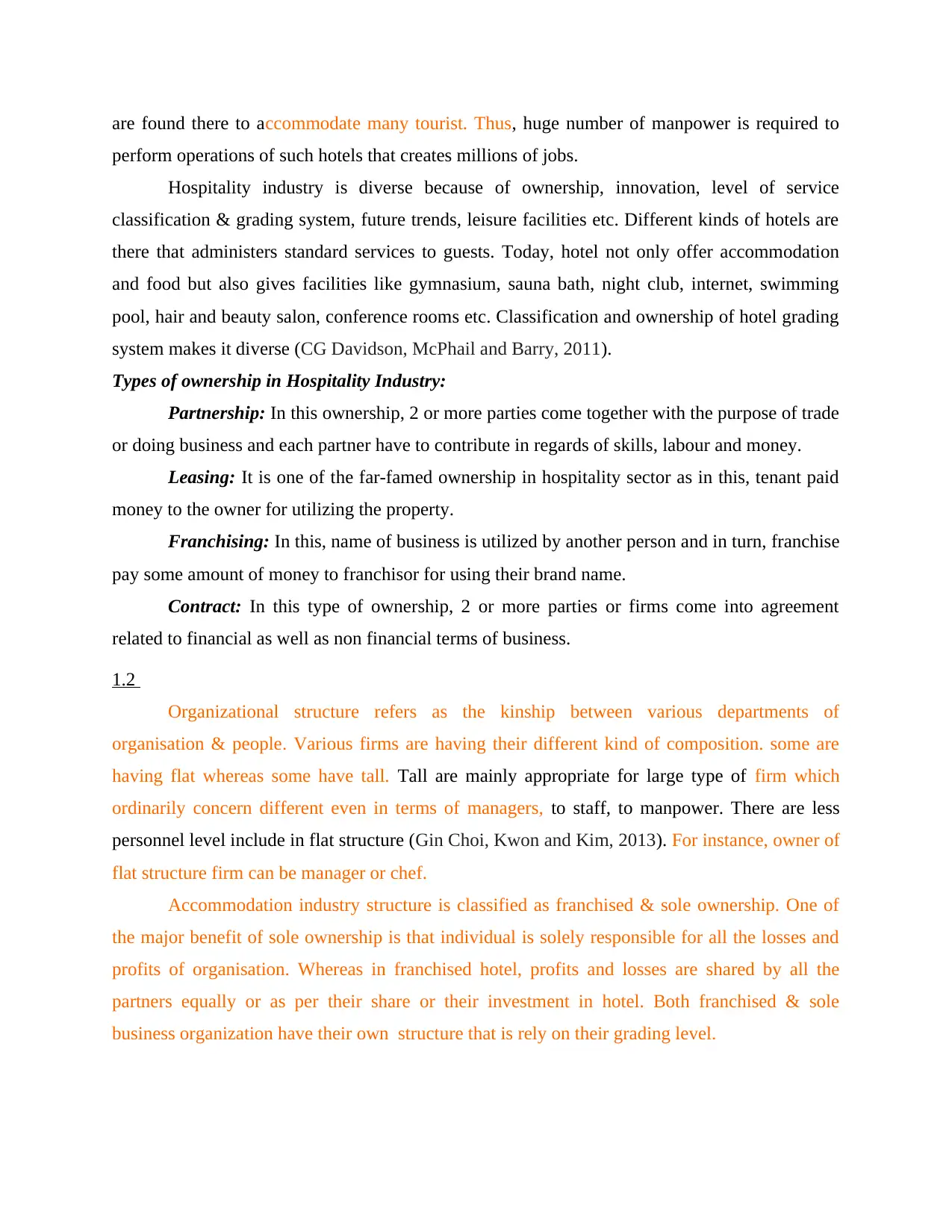
are found there to accommodate many tourist. Thus, huge number of manpower is required to
perform operations of such hotels that creates millions of jobs.
Hospitality industry is diverse because of ownership, innovation, level of service
classification & grading system, future trends, leisure facilities etc. Different kinds of hotels are
there that administers standard services to guests. Today, hotel not only offer accommodation
and food but also gives facilities like gymnasium, sauna bath, night club, internet, swimming
pool, hair and beauty salon, conference rooms etc. Classification and ownership of hotel grading
system makes it diverse (CG Davidson, McPhail and Barry, 2011).
Types of ownership in Hospitality Industry:
Partnership: In this ownership, 2 or more parties come together with the purpose of trade
or doing business and each partner have to contribute in regards of skills, labour and money.
Leasing: It is one of the far-famed ownership in hospitality sector as in this, tenant paid
money to the owner for utilizing the property.
Franchising: In this, name of business is utilized by another person and in turn, franchise
pay some amount of money to franchisor for using their brand name.
Contract: In this type of ownership, 2 or more parties or firms come into agreement
related to financial as well as non financial terms of business.
1.2
Organizational structure refers as the kinship between various departments of
organisation & people. Various firms are having their different kind of composition. some are
having flat whereas some have tall. Tall are mainly appropriate for large type of firm which
ordinarily concern different even in terms of managers, to staff, to manpower. There are less
personnel level include in flat structure (Gin Choi, Kwon and Kim, 2013). For instance, owner of
flat structure firm can be manager or chef.
Accommodation industry structure is classified as franchised & sole ownership. One of
the major benefit of sole ownership is that individual is solely responsible for all the losses and
profits of organisation. Whereas in franchised hotel, profits and losses are shared by all the
partners equally or as per their share or their investment in hotel. Both franchised & sole
business organization have their own structure that is rely on their grading level.
perform operations of such hotels that creates millions of jobs.
Hospitality industry is diverse because of ownership, innovation, level of service
classification & grading system, future trends, leisure facilities etc. Different kinds of hotels are
there that administers standard services to guests. Today, hotel not only offer accommodation
and food but also gives facilities like gymnasium, sauna bath, night club, internet, swimming
pool, hair and beauty salon, conference rooms etc. Classification and ownership of hotel grading
system makes it diverse (CG Davidson, McPhail and Barry, 2011).
Types of ownership in Hospitality Industry:
Partnership: In this ownership, 2 or more parties come together with the purpose of trade
or doing business and each partner have to contribute in regards of skills, labour and money.
Leasing: It is one of the far-famed ownership in hospitality sector as in this, tenant paid
money to the owner for utilizing the property.
Franchising: In this, name of business is utilized by another person and in turn, franchise
pay some amount of money to franchisor for using their brand name.
Contract: In this type of ownership, 2 or more parties or firms come into agreement
related to financial as well as non financial terms of business.
1.2
Organizational structure refers as the kinship between various departments of
organisation & people. Various firms are having their different kind of composition. some are
having flat whereas some have tall. Tall are mainly appropriate for large type of firm which
ordinarily concern different even in terms of managers, to staff, to manpower. There are less
personnel level include in flat structure (Gin Choi, Kwon and Kim, 2013). For instance, owner of
flat structure firm can be manager or chef.
Accommodation industry structure is classified as franchised & sole ownership. One of
the major benefit of sole ownership is that individual is solely responsible for all the losses and
profits of organisation. Whereas in franchised hotel, profits and losses are shared by all the
partners equally or as per their share or their investment in hotel. Both franchised & sole
business organization have their own structure that is rely on their grading level.
Paraphrase This Document
Need a fresh take? Get an instant paraphrase of this document with our AI Paraphraser
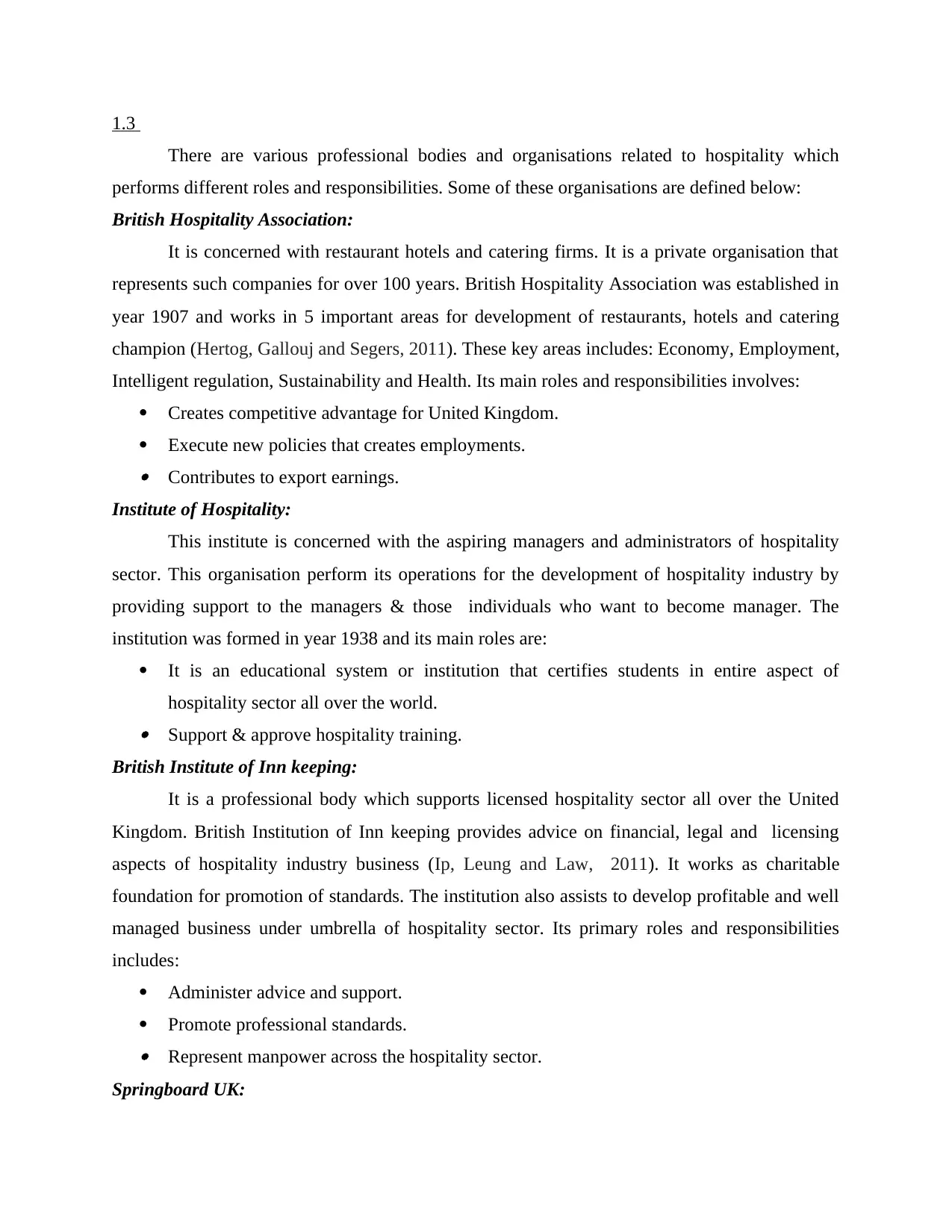
1.3
There are various professional bodies and organisations related to hospitality which
performs different roles and responsibilities. Some of these organisations are defined below:
British Hospitality Association:
It is concerned with restaurant hotels and catering firms. It is a private organisation that
represents such companies for over 100 years. British Hospitality Association was established in
year 1907 and works in 5 important areas for development of restaurants, hotels and catering
champion (Hertog, Gallouj and Segers, 2011). These key areas includes: Economy, Employment,
Intelligent regulation, Sustainability and Health. Its main roles and responsibilities involves:
Creates competitive advantage for United Kingdom.
Execute new policies that creates employments. Contributes to export earnings.
Institute of Hospitality:
This institute is concerned with the aspiring managers and administrators of hospitality
sector. This organisation perform its operations for the development of hospitality industry by
providing support to the managers & those individuals who want to become manager. The
institution was formed in year 1938 and its main roles are:
It is an educational system or institution that certifies students in entire aspect of
hospitality sector all over the world. Support & approve hospitality training.
British Institute of Inn keeping:
It is a professional body which supports licensed hospitality sector all over the United
Kingdom. British Institution of Inn keeping provides advice on financial, legal and licensing
aspects of hospitality industry business (Ip, Leung and Law, 2011). It works as charitable
foundation for promotion of standards. The institution also assists to develop profitable and well
managed business under umbrella of hospitality sector. Its primary roles and responsibilities
includes:
Administer advice and support.
Promote professional standards. Represent manpower across the hospitality sector.
Springboard UK:
There are various professional bodies and organisations related to hospitality which
performs different roles and responsibilities. Some of these organisations are defined below:
British Hospitality Association:
It is concerned with restaurant hotels and catering firms. It is a private organisation that
represents such companies for over 100 years. British Hospitality Association was established in
year 1907 and works in 5 important areas for development of restaurants, hotels and catering
champion (Hertog, Gallouj and Segers, 2011). These key areas includes: Economy, Employment,
Intelligent regulation, Sustainability and Health. Its main roles and responsibilities involves:
Creates competitive advantage for United Kingdom.
Execute new policies that creates employments. Contributes to export earnings.
Institute of Hospitality:
This institute is concerned with the aspiring managers and administrators of hospitality
sector. This organisation perform its operations for the development of hospitality industry by
providing support to the managers & those individuals who want to become manager. The
institution was formed in year 1938 and its main roles are:
It is an educational system or institution that certifies students in entire aspect of
hospitality sector all over the world. Support & approve hospitality training.
British Institute of Inn keeping:
It is a professional body which supports licensed hospitality sector all over the United
Kingdom. British Institution of Inn keeping provides advice on financial, legal and licensing
aspects of hospitality industry business (Ip, Leung and Law, 2011). It works as charitable
foundation for promotion of standards. The institution also assists to develop profitable and well
managed business under umbrella of hospitality sector. Its primary roles and responsibilities
includes:
Administer advice and support.
Promote professional standards. Represent manpower across the hospitality sector.
Springboard UK:
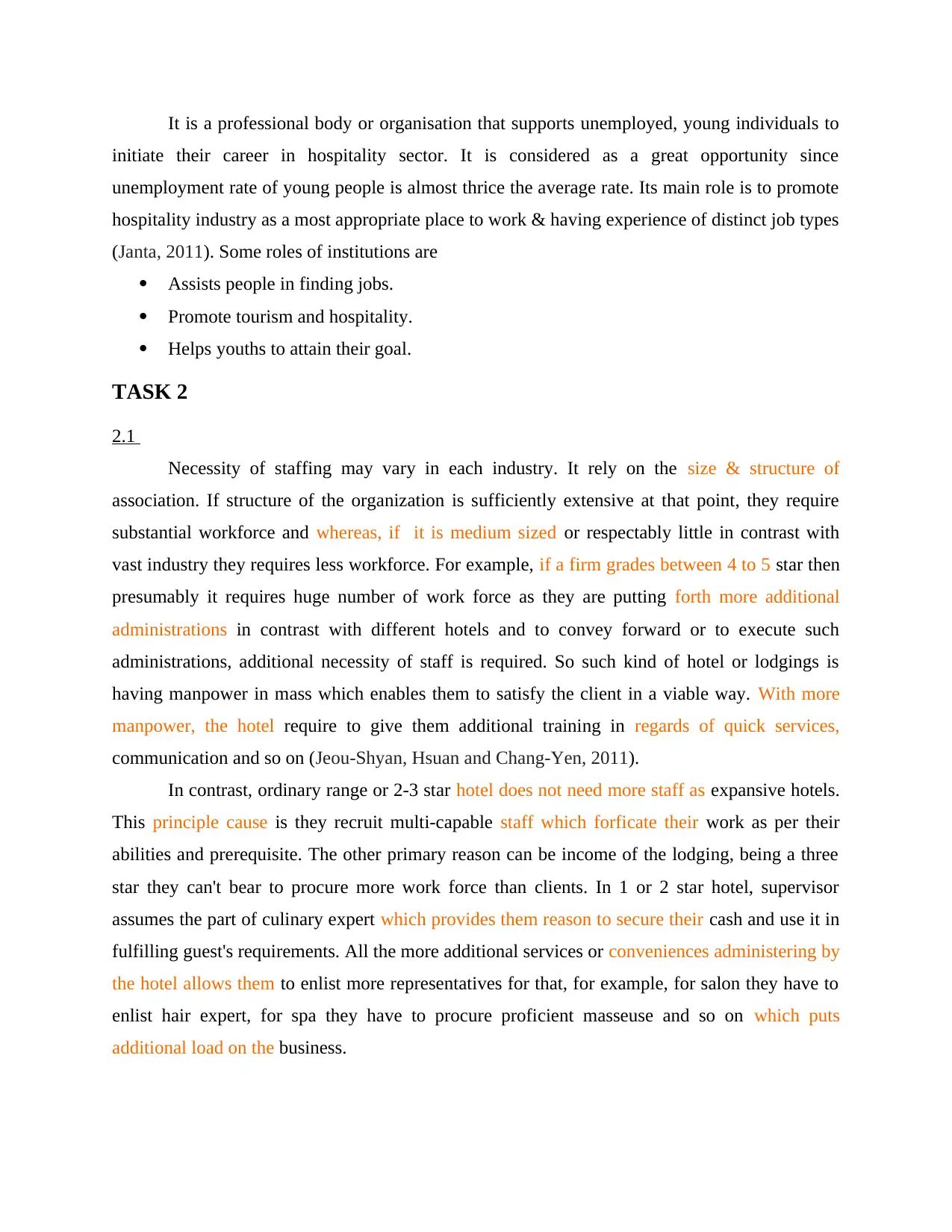
It is a professional body or organisation that supports unemployed, young individuals to
initiate their career in hospitality sector. It is considered as a great opportunity since
unemployment rate of young people is almost thrice the average rate. Its main role is to promote
hospitality industry as a most appropriate place to work & having experience of distinct job types
(Janta, 2011). Some roles of institutions are
Assists people in finding jobs.
Promote tourism and hospitality.
Helps youths to attain their goal.
TASK 2
2.1
Necessity of staffing may vary in each industry. It rely on the size & structure of
association. If structure of the organization is sufficiently extensive at that point, they require
substantial workforce and whereas, if it is medium sized or respectably little in contrast with
vast industry they requires less workforce. For example, if a firm grades between 4 to 5 star then
presumably it requires huge number of work force as they are putting forth more additional
administrations in contrast with different hotels and to convey forward or to execute such
administrations, additional necessity of staff is required. So such kind of hotel or lodgings is
having manpower in mass which enables them to satisfy the client in a viable way. With more
manpower, the hotel require to give them additional training in regards of quick services,
communication and so on (Jeou-Shyan, Hsuan and Chang-Yen, 2011).
In contrast, ordinary range or 2-3 star hotel does not need more staff as expansive hotels.
This principle cause is they recruit multi-capable staff which forficate their work as per their
abilities and prerequisite. The other primary reason can be income of the lodging, being a three
star they can't bear to procure more work force than clients. In 1 or 2 star hotel, supervisor
assumes the part of culinary expert which provides them reason to secure their cash and use it in
fulfilling guest's requirements. All the more additional services or conveniences administering by
the hotel allows them to enlist more representatives for that, for example, for salon they have to
enlist hair expert, for spa they have to procure proficient masseuse and so on which puts
additional load on the business.
initiate their career in hospitality sector. It is considered as a great opportunity since
unemployment rate of young people is almost thrice the average rate. Its main role is to promote
hospitality industry as a most appropriate place to work & having experience of distinct job types
(Janta, 2011). Some roles of institutions are
Assists people in finding jobs.
Promote tourism and hospitality.
Helps youths to attain their goal.
TASK 2
2.1
Necessity of staffing may vary in each industry. It rely on the size & structure of
association. If structure of the organization is sufficiently extensive at that point, they require
substantial workforce and whereas, if it is medium sized or respectably little in contrast with
vast industry they requires less workforce. For example, if a firm grades between 4 to 5 star then
presumably it requires huge number of work force as they are putting forth more additional
administrations in contrast with different hotels and to convey forward or to execute such
administrations, additional necessity of staff is required. So such kind of hotel or lodgings is
having manpower in mass which enables them to satisfy the client in a viable way. With more
manpower, the hotel require to give them additional training in regards of quick services,
communication and so on (Jeou-Shyan, Hsuan and Chang-Yen, 2011).
In contrast, ordinary range or 2-3 star hotel does not need more staff as expansive hotels.
This principle cause is they recruit multi-capable staff which forficate their work as per their
abilities and prerequisite. The other primary reason can be income of the lodging, being a three
star they can't bear to procure more work force than clients. In 1 or 2 star hotel, supervisor
assumes the part of culinary expert which provides them reason to secure their cash and use it in
fulfilling guest's requirements. All the more additional services or conveniences administering by
the hotel allows them to enlist more representatives for that, for example, for salon they have to
enlist hair expert, for spa they have to procure proficient masseuse and so on which puts
additional load on the business.
⊘ This is a preview!⊘
Do you want full access?
Subscribe today to unlock all pages.

Trusted by 1+ million students worldwide
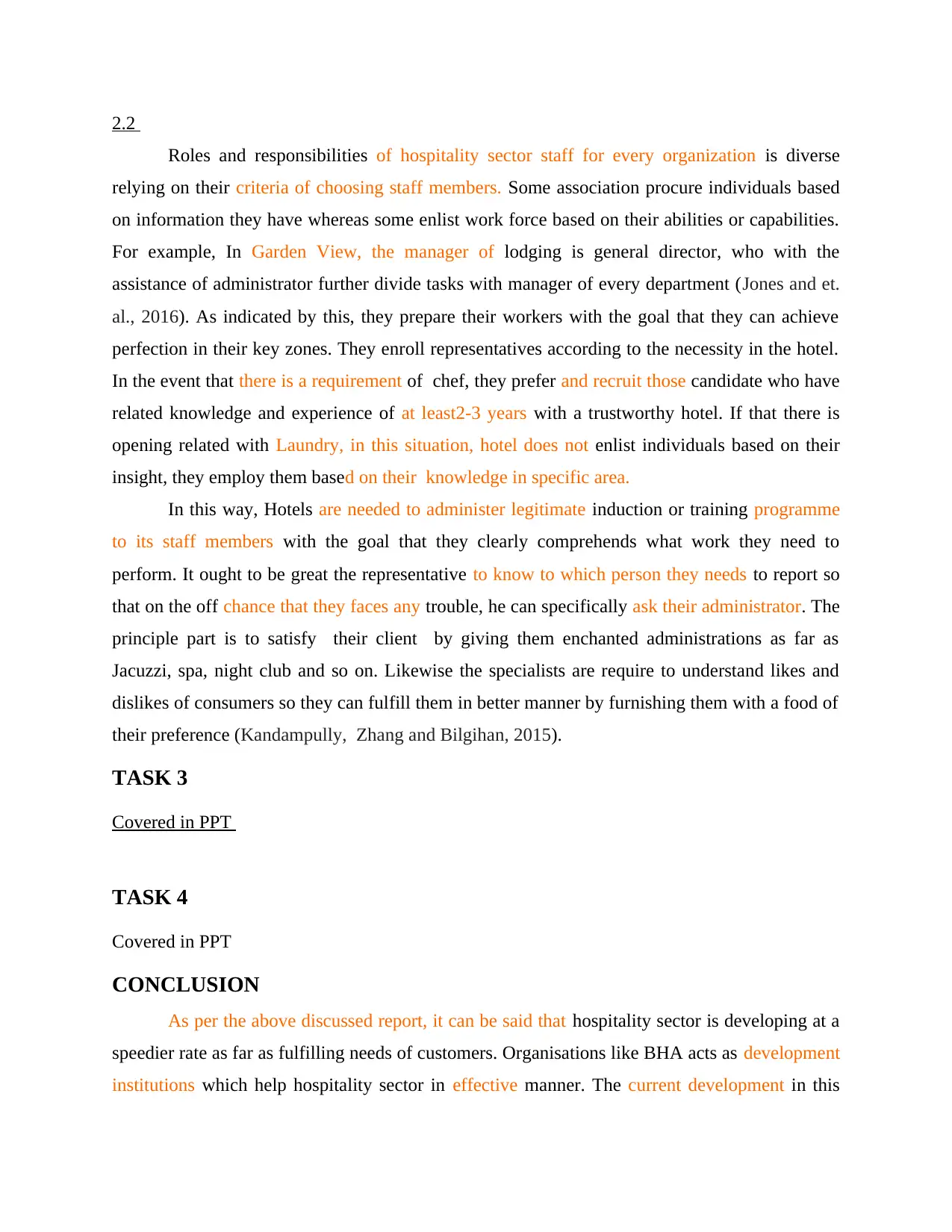
2.2
Roles and responsibilities of hospitality sector staff for every organization is diverse
relying on their criteria of choosing staff members. Some association procure individuals based
on information they have whereas some enlist work force based on their abilities or capabilities.
For example, In Garden View, the manager of lodging is general director, who with the
assistance of administrator further divide tasks with manager of every department (Jones and et.
al., 2016). As indicated by this, they prepare their workers with the goal that they can achieve
perfection in their key zones. They enroll representatives according to the necessity in the hotel.
In the event that there is a requirement of chef, they prefer and recruit those candidate who have
related knowledge and experience of at least2-3 years with a trustworthy hotel. If that there is
opening related with Laundry, in this situation, hotel does not enlist individuals based on their
insight, they employ them based on their knowledge in specific area.
In this way, Hotels are needed to administer legitimate induction or training programme
to its staff members with the goal that they clearly comprehends what work they need to
perform. It ought to be great the representative to know to which person they needs to report so
that on the off chance that they faces any trouble, he can specifically ask their administrator. The
principle part is to satisfy their client by giving them enchanted administrations as far as
Jacuzzi, spa, night club and so on. Likewise the specialists are require to understand likes and
dislikes of consumers so they can fulfill them in better manner by furnishing them with a food of
their preference (Kandampully, Zhang and Bilgihan, 2015).
TASK 3
Covered in PPT
TASK 4
Covered in PPT
CONCLUSION
As per the above discussed report, it can be said that hospitality sector is developing at a
speedier rate as far as fulfilling needs of customers. Organisations like BHA acts as development
institutions which help hospitality sector in effective manner. The current development in this
Roles and responsibilities of hospitality sector staff for every organization is diverse
relying on their criteria of choosing staff members. Some association procure individuals based
on information they have whereas some enlist work force based on their abilities or capabilities.
For example, In Garden View, the manager of lodging is general director, who with the
assistance of administrator further divide tasks with manager of every department (Jones and et.
al., 2016). As indicated by this, they prepare their workers with the goal that they can achieve
perfection in their key zones. They enroll representatives according to the necessity in the hotel.
In the event that there is a requirement of chef, they prefer and recruit those candidate who have
related knowledge and experience of at least2-3 years with a trustworthy hotel. If that there is
opening related with Laundry, in this situation, hotel does not enlist individuals based on their
insight, they employ them based on their knowledge in specific area.
In this way, Hotels are needed to administer legitimate induction or training programme
to its staff members with the goal that they clearly comprehends what work they need to
perform. It ought to be great the representative to know to which person they needs to report so
that on the off chance that they faces any trouble, he can specifically ask their administrator. The
principle part is to satisfy their client by giving them enchanted administrations as far as
Jacuzzi, spa, night club and so on. Likewise the specialists are require to understand likes and
dislikes of consumers so they can fulfill them in better manner by furnishing them with a food of
their preference (Kandampully, Zhang and Bilgihan, 2015).
TASK 3
Covered in PPT
TASK 4
Covered in PPT
CONCLUSION
As per the above discussed report, it can be said that hospitality sector is developing at a
speedier rate as far as fulfilling needs of customers. Organisations like BHA acts as development
institutions which help hospitality sector in effective manner. The current development in this
Paraphrase This Document
Need a fresh take? Get an instant paraphrase of this document with our AI Paraphraser

division terms of offering different luxuries to its customer give them a reason to gain
competitive edge at immense level in the worldwide market. Many visitors visit London
consistently which gives this segment a cause, to serve the customer in satisfy their desire by
providing them such administration that animates them in a successful way.
competitive edge at immense level in the worldwide market. Many visitors visit London
consistently which gives this segment a cause, to serve the customer in satisfy their desire by
providing them such administration that animates them in a successful way.
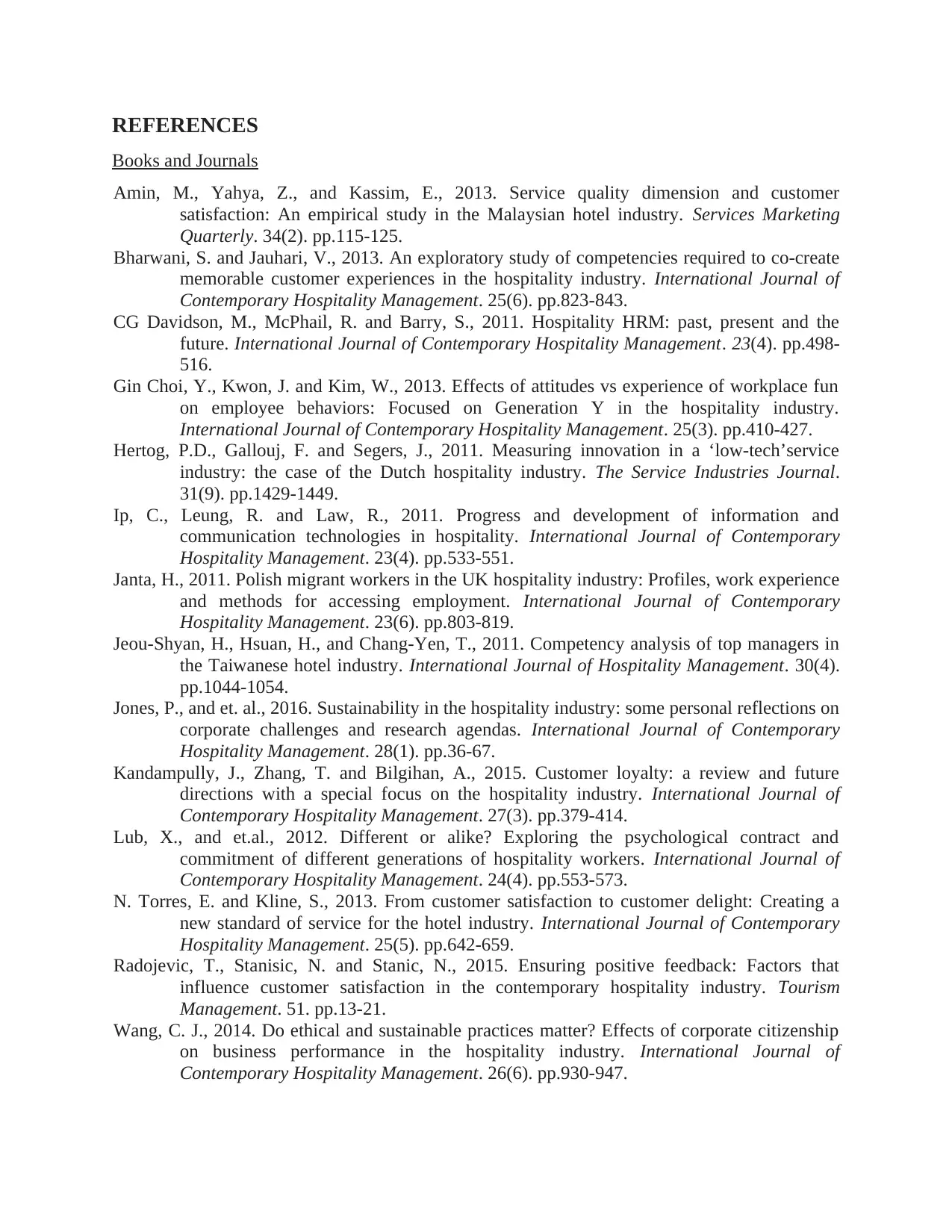
REFERENCES
Books and Journals
Amin, M., Yahya, Z., and Kassim, E., 2013. Service quality dimension and customer
satisfaction: An empirical study in the Malaysian hotel industry. Services Marketing
Quarterly. 34(2). pp.115-125.
Bharwani, S. and Jauhari, V., 2013. An exploratory study of competencies required to co-create
memorable customer experiences in the hospitality industry. International Journal of
Contemporary Hospitality Management. 25(6). pp.823-843.
CG Davidson, M., McPhail, R. and Barry, S., 2011. Hospitality HRM: past, present and the
future. International Journal of Contemporary Hospitality Management. 23(4). pp.498-
516.
Gin Choi, Y., Kwon, J. and Kim, W., 2013. Effects of attitudes vs experience of workplace fun
on employee behaviors: Focused on Generation Y in the hospitality industry.
International Journal of Contemporary Hospitality Management. 25(3). pp.410-427.
Hertog, P.D., Gallouj, F. and Segers, J., 2011. Measuring innovation in a ‘low-tech’service
industry: the case of the Dutch hospitality industry. The Service Industries Journal.
31(9). pp.1429-1449.
Ip, C., Leung, R. and Law, R., 2011. Progress and development of information and
communication technologies in hospitality. International Journal of Contemporary
Hospitality Management. 23(4). pp.533-551.
Janta, H., 2011. Polish migrant workers in the UK hospitality industry: Profiles, work experience
and methods for accessing employment. International Journal of Contemporary
Hospitality Management. 23(6). pp.803-819.
Jeou-Shyan, H., Hsuan, H., and Chang-Yen, T., 2011. Competency analysis of top managers in
the Taiwanese hotel industry. International Journal of Hospitality Management. 30(4).
pp.1044-1054.
Jones, P., and et. al., 2016. Sustainability in the hospitality industry: some personal reflections on
corporate challenges and research agendas. International Journal of Contemporary
Hospitality Management. 28(1). pp.36-67.
Kandampully, J., Zhang, T. and Bilgihan, A., 2015. Customer loyalty: a review and future
directions with a special focus on the hospitality industry. International Journal of
Contemporary Hospitality Management. 27(3). pp.379-414.
Lub, X., and et.al., 2012. Different or alike? Exploring the psychological contract and
commitment of different generations of hospitality workers. International Journal of
Contemporary Hospitality Management. 24(4). pp.553-573.
N. Torres, E. and Kline, S., 2013. From customer satisfaction to customer delight: Creating a
new standard of service for the hotel industry. International Journal of Contemporary
Hospitality Management. 25(5). pp.642-659.
Radojevic, T., Stanisic, N. and Stanic, N., 2015. Ensuring positive feedback: Factors that
influence customer satisfaction in the contemporary hospitality industry. Tourism
Management. 51. pp.13-21.
Wang, C. J., 2014. Do ethical and sustainable practices matter? Effects of corporate citizenship
on business performance in the hospitality industry. International Journal of
Contemporary Hospitality Management. 26(6). pp.930-947.
Books and Journals
Amin, M., Yahya, Z., and Kassim, E., 2013. Service quality dimension and customer
satisfaction: An empirical study in the Malaysian hotel industry. Services Marketing
Quarterly. 34(2). pp.115-125.
Bharwani, S. and Jauhari, V., 2013. An exploratory study of competencies required to co-create
memorable customer experiences in the hospitality industry. International Journal of
Contemporary Hospitality Management. 25(6). pp.823-843.
CG Davidson, M., McPhail, R. and Barry, S., 2011. Hospitality HRM: past, present and the
future. International Journal of Contemporary Hospitality Management. 23(4). pp.498-
516.
Gin Choi, Y., Kwon, J. and Kim, W., 2013. Effects of attitudes vs experience of workplace fun
on employee behaviors: Focused on Generation Y in the hospitality industry.
International Journal of Contemporary Hospitality Management. 25(3). pp.410-427.
Hertog, P.D., Gallouj, F. and Segers, J., 2011. Measuring innovation in a ‘low-tech’service
industry: the case of the Dutch hospitality industry. The Service Industries Journal.
31(9). pp.1429-1449.
Ip, C., Leung, R. and Law, R., 2011. Progress and development of information and
communication technologies in hospitality. International Journal of Contemporary
Hospitality Management. 23(4). pp.533-551.
Janta, H., 2011. Polish migrant workers in the UK hospitality industry: Profiles, work experience
and methods for accessing employment. International Journal of Contemporary
Hospitality Management. 23(6). pp.803-819.
Jeou-Shyan, H., Hsuan, H., and Chang-Yen, T., 2011. Competency analysis of top managers in
the Taiwanese hotel industry. International Journal of Hospitality Management. 30(4).
pp.1044-1054.
Jones, P., and et. al., 2016. Sustainability in the hospitality industry: some personal reflections on
corporate challenges and research agendas. International Journal of Contemporary
Hospitality Management. 28(1). pp.36-67.
Kandampully, J., Zhang, T. and Bilgihan, A., 2015. Customer loyalty: a review and future
directions with a special focus on the hospitality industry. International Journal of
Contemporary Hospitality Management. 27(3). pp.379-414.
Lub, X., and et.al., 2012. Different or alike? Exploring the psychological contract and
commitment of different generations of hospitality workers. International Journal of
Contemporary Hospitality Management. 24(4). pp.553-573.
N. Torres, E. and Kline, S., 2013. From customer satisfaction to customer delight: Creating a
new standard of service for the hotel industry. International Journal of Contemporary
Hospitality Management. 25(5). pp.642-659.
Radojevic, T., Stanisic, N. and Stanic, N., 2015. Ensuring positive feedback: Factors that
influence customer satisfaction in the contemporary hospitality industry. Tourism
Management. 51. pp.13-21.
Wang, C. J., 2014. Do ethical and sustainable practices matter? Effects of corporate citizenship
on business performance in the hospitality industry. International Journal of
Contemporary Hospitality Management. 26(6). pp.930-947.
⊘ This is a preview!⊘
Do you want full access?
Subscribe today to unlock all pages.

Trusted by 1+ million students worldwide

1 out of 10
Related Documents
Your All-in-One AI-Powered Toolkit for Academic Success.
+13062052269
info@desklib.com
Available 24*7 on WhatsApp / Email
![[object Object]](/_next/static/media/star-bottom.7253800d.svg)
Unlock your academic potential
Copyright © 2020–2026 A2Z Services. All Rights Reserved. Developed and managed by ZUCOL.





